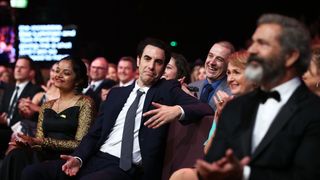Sacha Baron Cohen is back, with a new series called Who is America?. The British comedian, best known for his in-disguise interviews and political pranks, has set his sights on the United States, a country that has been in political turmoil since 2016.
Baron Cohen’s comedy can be powerful stuff. His ability to get politicians to do shocking things on camera – from promoting “kinderguardians,” an effort to arm five- and six-year-olds with guns, to stripping off their clothes and shouting racial epithets – has exposed hypocrisy, outlandishness and racism.
It has also outlived its usefulness.
Satire relies on ridicule and shame, the ability for audiences to laugh at something and to discredit the ideas behind it. But in the Trump era, the salience of shame and ridicule has largely disappeared, something evident in Baron Cohen’s skits.
Take, for instance, his segment set in Kingman, Arizona. Baron Cohen called together locals to weigh in on a new project in their town: the construction of the world’s largest mosque outside the Middle East.
The reaction was explosive. An audience member shouts that it’s “a terrorist mosque”. When Baron Cohen explains the security measures around the mosque, someone asks, “Why would we want them safe inside, when we don’t even want them in our town?” Another proclaims himself “racist toward Muslims” and threatens to burn down any mosque. A third shouts out, “black people aren’t welcome in Kingman, either”.
The four-minute segment packs in plenty of racism and anti-Muslim sentiment. But does it teach us anything new?
Satire relies on ridicule and shame, the ability for audiences to laugh at something and to discredit the ideas behind it. But in the Trump era, the salience of shame and ridicule has largely disappeared, something evident in Baron Cohen’s skits.
In the Trump era, these attitudes have become mainstream. From the travel ban targeting Muslims to the president’s concerns that immigrants “infest” the United States, racist rhetoric has moved from the fringes to the centre of American politics. And that makes satire such as Baron Cohen’s uncomfortable and ineffective. Watching the all-white audience hurling racist objections to a mosque proposal is no different from watching a Trump rally.
It is, in fact, that similarity that not only neuters Baron Cohen’s comedy but makes it dangerous. Whipping up anti-Muslim sentiment was never a particularly safe move, but in an era in which such ideas have been emboldened, it has the potential for real political impact.
As we approach the one-year anniversary of the white nationalist terrorism in Charlottesville, Virginia, we’re reminded of the significant cost of emboldening racism, even – perhaps especially – for sport.
The collapse of space between the real and the absurd likewise blunted Cohen’s comedy. Consider his widely viewed segment on gun rights, in which he persuades a number of political figures to endorse arming kindergarteners. Laughable, right?
Not really. Politicians and the NRA (the core gun-lobby organisation) have already advocated the positions Baron Cohen “tricked” people into supporting. The NRA has promoted “kid-friendly” rifles, and red-state legislators have sought to secure the gun-rights of pre-teen children. Getting GOP lawmakers on board with arming toddlers isn’t a parody – it’s a policy proposal.
There’s another danger to Baron Cohen’s performance, particularly when he’s posing as a journalist. There used to be sharp lines between parody and reality. Satirical sites like The Onion occasionally tricked people, but reality quickly snapped back into place, as journalists highlighted the parody at hand.
When the lines between fantasy and reality were fairly well-defined, this wasn’t a problem. But as misinformation has been weaponised, and real journalists dismissed as “fake news,” satire is no longer subversive – it now reinforces rising authoritarianism, muddying the waters of reality.
When the lines between fantasy and reality were fairly well-defined, this wasn’t a problem. But as misinformation has been weaponised, and real journalists dismissed as “fake news,” satire is no longer subversive – it now reinforces rising authoritarianism, muddying the waters of reality.
In the 2000s, liberals luxuriated in the politics of parody. Jon Stewart and Stephen Colbert served as alternatives to Fox News: sharp, entertaining, left-leaning. Scenting the hypocrisy of the right, they saw an opening for satirical commentary, pushing conservative arguments to their breaking point.
Donald Trump did the same. But instead of eliciting laughs from the left, he won votes from the right. He saw he could take that anger someone like Baron Cohen produced and turn it into his own political advantage; he saw he could take the blurred lines of satire and turn them into a weapon against reality.
That’s not to say Baron Cohen’s new show doesn’t elicit laughs. For liberals, who have had precious little to laugh at in recent years, Who is America? still generates guffaws. It collects scalps, too: a Georgia Republican resigned this week after appearing on the show, proving shame still matters.
But while the resignation shows that satire can still have an impact, it also reveals how diminished its powers are. What line did that officeholder have to cross to resign? He stripped naked and repeatedly shouted racial slurs. Even then, he was not immediately compelled to resign. He assumed he could ride it out. And why wouldn’t he? Trump has survived much worse.
Over the past 15 years, satire and parody have been crucial to political criticism. In the Trump era they’ve been defanged. That is a loss, but perhaps also a blessing, forcing opponents of the administration to argue passionately and sincerely for their vision of the country. That may mean fewer laughs, but it could very well lead to better government.






